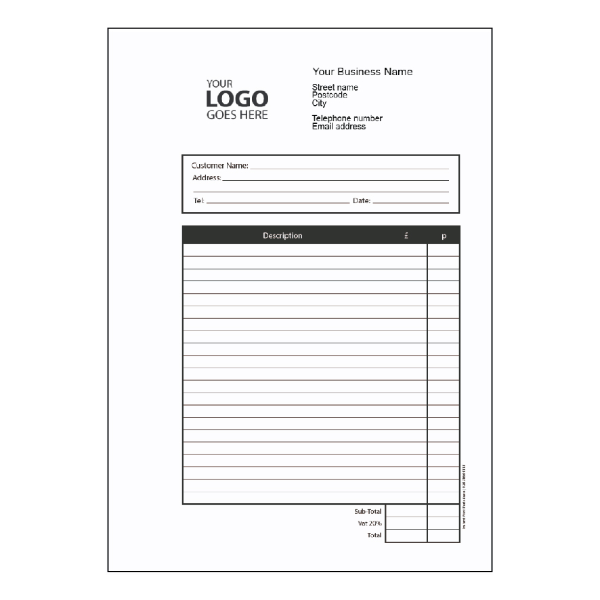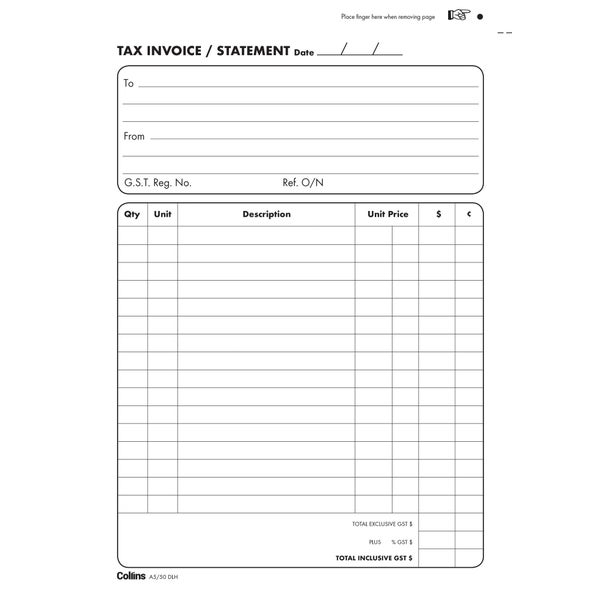Why an organized invoice book is critical during audits
Why an organized invoice book is critical during audits
Blog Article
Leading Tips for Successfully Managing Finances With an Invoice Book in Your Company
Effective monetary management is crucial for any company, and an invoice book plays a considerable role in this process. It offers as a vital device for monitoring revenue and expenditures while making sure prompt payments. Selecting the appropriate invoice book and arranging invoices properly are foundational actions. There are additional approaches to improve general effectiveness. Comprehending these techniques can significantly impact a business's economic security and growth potential. What are the most reliable techniques to mirror upon?
Recognizing the Value of an Invoice Book
An invoice book serves as an important tool for companies seeking to keep arranged financial documents. It enables business to document purchases systematically, guaranteeing that all sales and solutions made are properly videotaped. This organized paperwork is essential for tracking revenue, keeping an eye on money circulation, and handling expenses.Moreover, an invoice publication aids in keeping expertise in service ventures. Supplying clients with thorough invoices boosts integrity and count on, promoting more powerful customer partnerships. Additionally, it streamlines the process of declaring tax obligations, as all needed financial details is readily offered and arranged.
Choosing the Right invoice book for Your Service
Picking the suitable billing publication is vital for services looking to improve their economic monitoring. The selection typically hinges on numerous crucial factors, consisting of the nature of the company, the quantity of transactions, and particular invoicing needs. As an example, small companies with fewer transactions might benefit from an easy, pre-printed invoice book, while larger business may need personalized alternatives that permit for comprehensive itemization and branding.Additionally, organizations need to take into consideration whether they favor a physical or electronic layout. Digital invoice books can offer enhanced features like automated estimations and very easy information storage space, while physical publications supply a substantial record. It is also important to evaluate the book's layout for quality and simplicity of use. Eventually, the appropriate invoice book will not just promote efficient invoicing but additionally add to far better money circulation monitoring and enhanced customer relations.
Organizing Your Invoice for Easy Access
Organizing billings properly is essential for any business, as it assures fast access to important financial documents when needed. An organized method can enhance performance and lower tension during audits or economic analyses. It is recommended to classify invoices by kind, client, or day, enabling simple retrieval. Making use of color-coded folders or identified areas within a billing book can facilitate this process, ensuring that records are conveniently recognizable at a glance.Moreover, preserving a digital backup of physical billings can provide an extra layer of protection and ease of access. Routinely assessing and purging out-of-date billings will certainly help keep the system convenient, preventing clutter. Developing a routine for arranging and saving invoices, whether everyday or once a week, can significantly simplify financial operations. By prioritizing company, companies can conserve time, lower errors, and support much better monetary decision-making, inevitably bring about improved general monitoring of funds.
Monitoring Settlements and Due Dates
Maintaining track of settlements and due days is essential for preserving economic security. Organizing settlement schedules can assist people handle their capital efficiently while lessening late charges. In addition, establishing suggestion alerts assurances that no repayment target dates are forgotten.
Organize Payment Routines
Developing a clear repayment timetable is vital for preserving monetary security and guaranteeing prompt cash money circulation. Services can take advantage of arranging settlement timetables by classifying billings according to their due dates. This method permits easy identification of upcoming settlements, enabling positive monitoring of cash resources. By segmenting billings into weekly or month-to-month timelines, organizations can concentrate on critical repayments while also assessing patterns in money inflow. Additionally, an organized schedule help in forecasting future economic requirements, which is significant for budgeting functions. Constantly evaluating and upgrading repayment schedules assures that no due dates are missed, fostering solid connections with customers and vendors. Ultimately, a reliable repayment schedule boosts general economic monitoring and sustains a business's development goals.
Set Pointer Informs
Just Going Here how can services guarantee they never ever miss out on a repayment deadline? One reliable technique includes setting pointer signals. By carrying out automated tips, services can guarantee timely alerts for upcoming payments and due days. invoice book. This can be achieved through different approaches, such as schedule applications, invoicing software, or devoted reminder apps.These notifies can be set up to notify users days and even weeks ahead of time, enabling ample time for preparation. Furthermore, businesses ought to think about categorizing reminders based upon priority, guaranteeing that essential settlements receive special attention. By regularly utilizing pointer notifies, companies can improve their money circulation administration and preserve positive connections with customers and vendors. Eventually, this positive technique lessens the danger of late charges and promotes monetary stability

Applying Regular Billing Practices
Although lots of companies recognize the relevance of prompt repayments, implementing regular invoicing practices usually verifies challenging. Developing a standard invoicing procedure can noticeably boost capital monitoring. This includes setup details intervals for issuing billings, whether regular, bi-weekly, or monthly, depending on the nature of the business and customer relationships.Furthermore, organizations need to ensure that invoices are clear and in-depth, detailing services provided, repayment terms, and due dates. Utilizing a systematic approach to act on exceptional invoices is similarly crucial; tips can be automated to maintain professionalism and reliability and consistency.Additionally, educating staff on the billing process can cultivate accountability and accuracy, lowering errors that might postpone payments. Consistently evaluating and changing payment techniques can help companies remain lined up with sector criteria and customer assumptions, ultimately promoting a healthier monetary setting. Uniformity in these techniques not just enhances effectiveness yet also develops depend on with customers.
Using Invoice Templates for Effectiveness
Using billing templates can substantially improve the effectiveness of the billing creation procedure. By enhancing this job, services can save time and reduce mistakes, enabling quicker settlement cycles. Additionally, personalizing templates for branding objectives guarantees that invoices show the company's identification, strengthening professionalism and trust in customer communications.
Simplifying Invoice Creation Process
Improving the invoice development procedure can substantially enhance a business's effectiveness and accuracy. invoice book. By using pre-designed billing templates, businesses can reduce time invested on composing billings from scrape. These templates normally include necessary fields, such as client details, made a list of services, and settlement terms, making certain that all essential details are recorded consistently.Furthermore, employing billing software can automate estimations and reduce the likelihood of human error. This not only speeds up the process yet also improves record-keeping by keeping a digital archive of all billings issued. Additionally, standardized templates can assist in quicker testimonials and approvals within the company, making it possible for timely invoicing and boosting capital. Overall, an effective billing creation process is essential for keeping financial health and wellness in an affordable market
Customizing Design Templates for Branding
Tailoring billing design templates for branding can substantially enhance a service's specialist image while guaranteeing performance in the billing process. By including company logo designs, color design, and typography that show the brand identity, services webpage develop a natural appearance that fosters depend on and acknowledgment among clients. Tailored design templates can additionally improve information entry by incorporating pre-filled fields for customer details and solutions used, reducing errors and saving time. In addition, including personalized messages or regards to service can enhance customer partnerships. Businesses should routinely assess and update their billing designs to align with any type of branding changes, making sure that their billing process continues to be an extension of their brand name. This strategic method not just boosts performance however also strengthens the brand name's existence in the marketplace.
Frequently Examining Your Financial Health And Wellness

Frequently Asked Concerns
Exactly how Typically Should I Update My invoice book?
The regularity of updating an invoice publication differs by business needs. Typically, it is suggested to upgrade it routinely, preferably after each deal, to maintain accurate documents and help with effective financial management.
Can I Use Digital Invoices Instead of a Physical Book?
The inquiry of making use of electronic invoices rather than a physical publication suggests a shift towards modern economic administration - invoice book. Digital invoices offer ease and access, permitting services to enhance processes, reduce paper waste, and boost record-keeping effectiveness
What Should I Do if an Invoice Is Lost?
If an invoice is shed, the individual should without delay inform the client, edition a duplicate invoice, and record the circumstance for record-keeping. Maintaining a clear interaction trail can prevent prospective misunderstandings or disputes.

Exactly how Do I Deal With Late Payments Properly?
Handling late repayments effectively includes sending out polite suggestions, establishing clear settlement terms in advance, and maintaining open interaction with clients. Applying a structured follow-up procedure can significantly lower delays and enhance capital for business.
Is It Needed to Maintain Copies of Expired Invoices?
The need of keeping copies of ended billings differs by market and lawful needs. Some companies preserve them for reference, audits, or tax obligation purposes, while others may discard them, relying on their functional demands and plans.
Report this page